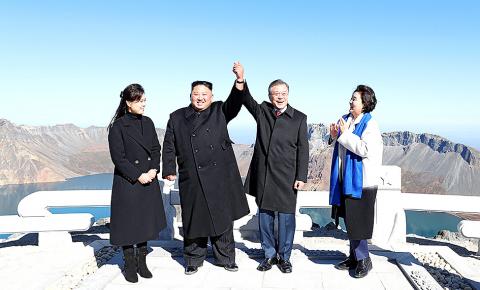North Korean leader Kim Jong-un and South Korean President Moon Jae-in yesterday visited the spiritual birthplace of the Korean nation for a show of unity after their summit gave new momentum to Pyongyang’s negotiations with Washington.
Kim on Wednesday agreed to shutter the Tongchang-ri missile-testing site in the presence of international observers, a move the US welcomed by saying it was ready for immediate talks aimed at denuclearizing North Korea.
Pyongyang also said it could dismantle its best-known nuclear facility at Yongbyon if the US takes “corresponding measures.”

Photo: AFP / Pyeongyang Press Corps
There was an important caveat — Moon told reporters on his return to Seoul that the US would need to “end hostile relations with North Korea and provide security guarantees for the regime.”
However, the declaration appeared to break the North’s logjam with Washington.
US President Donald Trump welcomed the move, tweeting that Kim had “agreed to allow Nuclear inspections, subject to final negotiations.”
US Secretary of State Mike Pompeo also praised the “important commitments,” saying he had invited his North Korean counterpart for talks next week on the sidelines of the UN General Assembly, and representatives of both sides to meet “at the earliest opportunity” in Vienna — home of the International Atomic Energy Agency.
Washington was ready to “engage immediately in negotiations” to achieve the North’s denuclearization by January 2021, Pompeo added.
Kim was hoping for a second summit with Trump “at an early date,” Moon said, adding that he would take Trump a message from Kim when he meets him next week.
Experts remain skeptical, saying that closing Tongchang-ri would have no effect on the North’s ability to manufacture rockets.
Pyongyang has used several other locations for missile launches. Many also believe the North has other covert nuclear facilities.
“The North Koreans are offering gestures that mimic disarmament,” arms control expert Jeffrey Lewis tweeted. “They don’t meaningfully constrain North Korea’s nuclear program.”
Their main purpose was “to appease Trump, so that Moon and Kim can keep their engagement alive,” he added.
Yesterday, Moon and Kim, accompanied by their wives, visited Mount Paektu on the Chinese border.
The 2,744m peak is considered sacred by all Koreans as the birthplace of Dangun, the legendary founder of the first Korean kingdom.
According to Pyongyang’s narrative, it is also where Kim Jong-un’s father, former North Korean leader Kim Jong-il, was born, at a secret camp where his own father, state founder Kim Il-sung, was fighting Korea’s Japanese colonial occupiers.
However, historians say that Kim Jong-il was born in the Soviet Union, where his father was in exile.
South Korean tourists flock to see the mountain via China, but only a handful have been granted access from the North Korean side, mostly for research purposes.
Kim and Moon raised their clasped hands aloft on the crater rim as Moon said he hopes many of his compatriots would follow in his footsteps.

SECURITY: As China is ‘reshaping’ Hong Kong’s population, Taiwan must raise the eligibility threshold for applications from Hong Kongers, Chiu Chui-cheng said When Hong Kong and Macau citizens apply for residency in Taiwan, it would be under a new category that includes a “national security observation period,” Mainland Affairs Council (MAC) Minister Chiu Chui-cheng (邱垂正) said yesterday. President William Lai (賴清德) on March 13 announced 17 strategies to counter China’s aggression toward Taiwan, including incorporating national security considerations into the review process for residency applications from Hong Kong and Macau citizens. The situation in Hong Kong is constantly changing, Chiu said to media yesterday on the sidelines of the Taipei Technology Run hosted by the Taipei Neihu Technology Park Development Association. With

CARROT AND STICK: While unrelenting in its military threats, China attracted nearly 40,000 Taiwanese to over 400 business events last year Nearly 40,000 Taiwanese last year joined industry events in China, such as conferences and trade fairs, supported by the Chinese government, a study showed yesterday, as Beijing ramps up a charm offensive toward Taipei alongside military pressure. China has long taken a carrot-and-stick approach to Taiwan, threatening it with the prospect of military action while reaching out to those it believes are amenable to Beijing’s point of view. Taiwanese security officials are wary of what they see as Beijing’s influence campaigns to sway public opinion after Taipei and Beijing gradually resumed travel links halted by the COVID-19 pandemic, but the scale of

A US Marine Corps regiment equipped with Naval Strike Missiles (NSM) is set to participate in the upcoming Balikatan 25 exercise in the Luzon Strait, marking the system’s first-ever deployment in the Philippines. US and Philippine officials have separately confirmed that the Navy Marine Expeditionary Ship Interdiction System (NMESIS) — the mobile launch platform for the Naval Strike Missile — would take part in the joint exercise. The missiles are being deployed to “a strategic first island chain chokepoint” in the waters between Taiwan proper and the Philippines, US-based Naval News reported. “The Luzon Strait and Bashi Channel represent a critical access

Pope Francis is be laid to rest on Saturday after lying in state for three days in St Peter’s Basilica, where the faithful are expected to flock to pay their respects to history’s first Latin American pontiff. The cardinals met yesterday in the Vatican’s synod hall to chart the next steps before a conclave begins to choose Francis’ successor, as condolences poured in from around the world. According to current norms, the conclave must begin between May 5 and 10. The cardinals set the funeral for Saturday at 10am in St Peter’s Square, to be celebrated by the dean of the College